Lion fish stalks and captures unsuspecting small fish
Lionfish are incredible predators, sometimes referred to as the "terror of the reef". Despite their relatively small size, at approximately 18 inches, they are voracious feeders, consuming as many as 25-30 smaller fish each day. This is a serious problem in the Atlantic Ocean where they have no natural predators. In those waters, they are invasive species.But here in Tonga, the Lionfish is a natural part of the food web and is not considered a threat to the reef.
The Lionfish is an extremely capable and deadly predator, with an ambush technique that is very impressive. It spreads its long and ornate fins out and slowly drifts toward an unsuspecting fish. Not looking like a fish, it does not appear to be a threat to its prey. But when it gets within a few inches, it lunges forward with unbelievable speed and inhales powerfully, sucking the prey into its large mouth. This is a similar hunting technique that is used by groupers and bass. But the Lionfish uses a deadly combination of disguise and ambush that make it formidable.
In this video, a scuba diver has come across a large Lionfish that is stalking small fish around coral heads near a small island named Vava'u in Tonga. The Lionfish slowly approaches its unwary meal and corals it with the widespread fins. It moves almost imperceptibly forward until the smaller fish is within striking distance of its mouth. In an instant, the Lionfish pounces and inhales its food. Even in slow motion, the lunge is difficult to see. The Lionfish will continue this stalking and eating throughout the night, consuming as many fish as it can catch. Although they also hunt in the day, they are largely nocturnal feeders.
The Lionfish is a particularly beautiful fish and a delight for scuba divers to see in the Pacific Ocean. Although they are striking in appearance, they are also a fish to be wary of. Their fins contain a powerful toxin and sharp barbs that can deliver a sting so potent that a human will experience intense pain for days after contact. It is not uncommon for Lionfish stings to cause severe nausea, swelling, shortness of breath, and in extreme cases, respiratory distress. Divers avoid contact with them at all costs. Seeing one hunting was a rare opportunity.
-
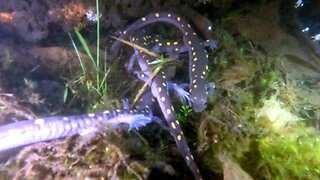 2:31
2:31
WildCreatures
21 days ago $1.21 earnedMidnight snorkelers capture incredible salamander migration
4.69K12 -
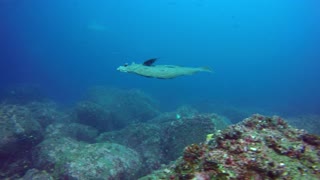 0:37
0:37
WildCreatures
2 years ago $43.49 earnedScuba diver captures one of the ocean's most bizarre fish
135K92 -
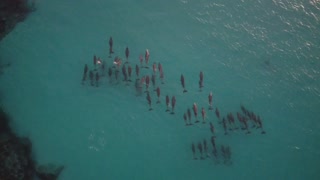 0:47
0:47
Damojean
1 year ago $4.66 earnedDrone captures pod of dolphins swimming at sunrise
9.21K37 -
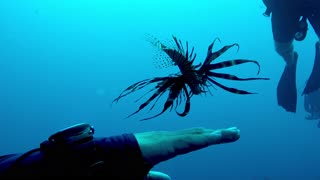 0:28
0:28
KristysWorld
2 years ago $23.63 earnedScuba diver handles highly venomous invasive lion fish
13K25 -
 1:19
1:19
KristysWorld
2 years ago $7.09 earnedAgitated sharks grapple over speared invasive lion fish
14.1K25 -
 2:00
2:00
ViralHog
2 years ago $0.11 earnedMountain Lion Stalks Hiker in Utah
9.68K3 -
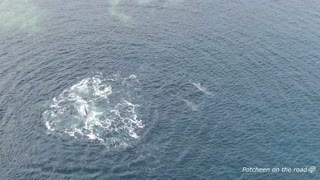 3:15
3:15
galwaycinematography
1 year agoDrone captures playful dolphin pod off Irish coast
11.3K44 -
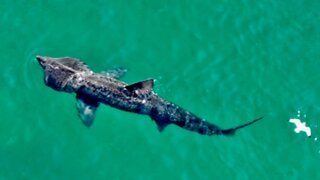 3:07
3:07
galwaycinematography
2 years agoDrone footage captures giant basking sharks in Ireland
11.8K103 -
 1:16
1:16
KristysWorld
2 years ago $2.18 earnedGiant Galapagos Tortoises Feast On Elephant Ear Stalks
8.48K13 -
 0:20
0:20
lallangoappench
2 years ago $8.19 earnedAwesome Safari Footage Captures Tiger Relaxing On The Road
12.6K22